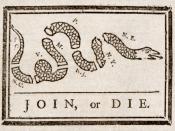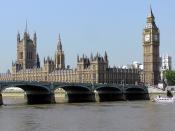WERE AMERICAN REVOLUTIONARIES FIGHTING FOR THE RIGHTS OF ENGLISHMEN In September 1774 the first Continental Congress met in Philadelphia PA, and after some protracted discussion, issued the Declaration and Resolves of the First Continental Congress. Twelve of the thirteen colonies were present, the exception being Georgia. Discussion centred on the on the perceived infringements of their "rights as Englishmen" as inflicted upon them by the Parliament in London. The Congress stated " The inhabitants of the English Colonies of North America, by the immutable laws of nature, principles of the English Constitution, and the several charters or compacts, have the following rights" Most of the rights then referred to were "rights of Englishmen" perceived to have been violated by, at this stage, Parliament ie: The right to life Liberty and Property.
The right to participate in legislative council.
The right to the common law of England The benefit of English statutes.
The privileges granted by Royal Charters or Provincial Laws Independence between branches of the legislature.
Because the English Constitution was, in the main, not written down and contained in one document, or adopted at one specific time, it was extremely easy for misunderstandings, disagreement and contra interpretation to arise.
Therefore, the English constitution, as understood by the politically active and aware colonists was one that actively enabled restraint on any abuse of power, it held in check any capricious legislation that might be implemented by any of the three estates; King, Lords or Commons.
The Colonies considered that Parliament was legislating for them without any colonial representation to moderate or mediate on their behalf. They further believed that without any colonial representation Parliament could not legally impose taxes or enact statutes to ensure the collection of revenue. Parliament did not interpret the English constitution in the same...


